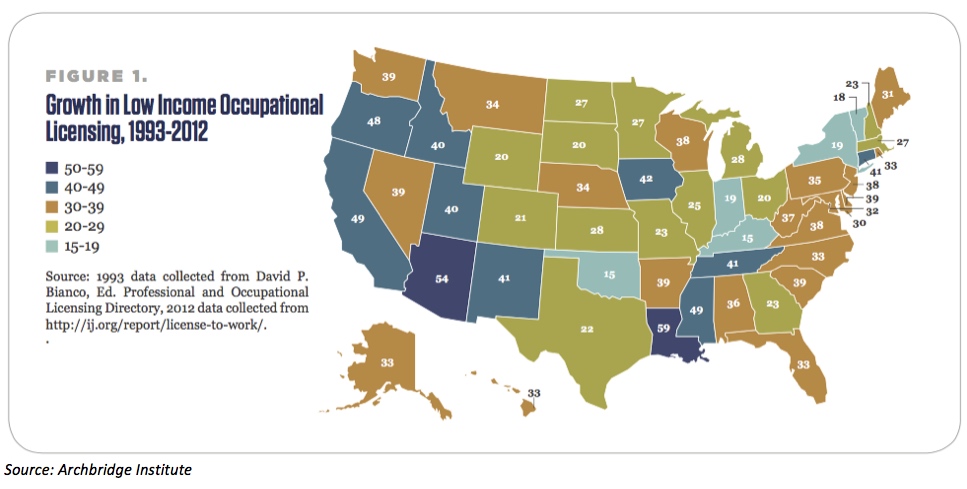A new report from Archbridge Institute finds that occupational licensing is negatively correlated with economic mobility.
What does that mean in plain English? As the report authors ask, “is occupational licensing preventing individuals from earning more than their parents did?”
They find good reason to think it is. They conclude,
the findings of this paper shed light on a suggestive relationship between the growth of occupational licensing, the economic mobility of low-income Americans, and income inequality. More specifically, our analysis suggests that growth in occupational licensing of low- and moderate-income occupations may be limiting opportunities for upward economic mobility (a 1.7% to 6.7% reduction evaluated at the mean). Licensing shrinks the pool of potential laborers by creating barriers to entry and this reduction in mobility also seems to relate to increases in income inequality (3.9% to 15.4% evaluated at the mean) as measured by U.S. county-level Gini coefficients.
The problem seems worse for low- and moderate-income workers. The report urges policymakers to
take note of the potential distributional consequences of this growing phenomenon as they reconsider occupational licensing requirements for low- and moderate-income occupations. In addition to raising prices for consumers, occupational licensing may be creating barriers to opportunity that prevent the least fortunate Americans from achieving the American dream of prosperity.
The report offers a look at how occupational licensing for low- to moderate-income professions grew from 1993 to 2012. In North Carolina over that 20-year window, 33 low- to moderate-income professions fell under state licensing.

For more information
Readers interested in occupational licensing in North Carolina and how to reform it can find that information here, for example:
- Modernizing North Carolina’s Outdated Occupational Licensing Practices (report)
- Occupational Licensing (John Locke Foundation policy position)
- Examining the Right to Earn a Living Act (in-depth series looking at a reform proposal adopted by two states and under consideration from several more)
- Charting the growth of occupational licensing in North Carolina over time (charts with explanation)
- How North Carolina compares with other states on several aspects of licensing: overall extent of licensing; low- to moderate-income jobs affected; overall burden of fulfilling license requirements; number of disqualifications from receiving a job license because of a conviction record (whether related to the job or not); training hours required to earn a license just to braid hair


